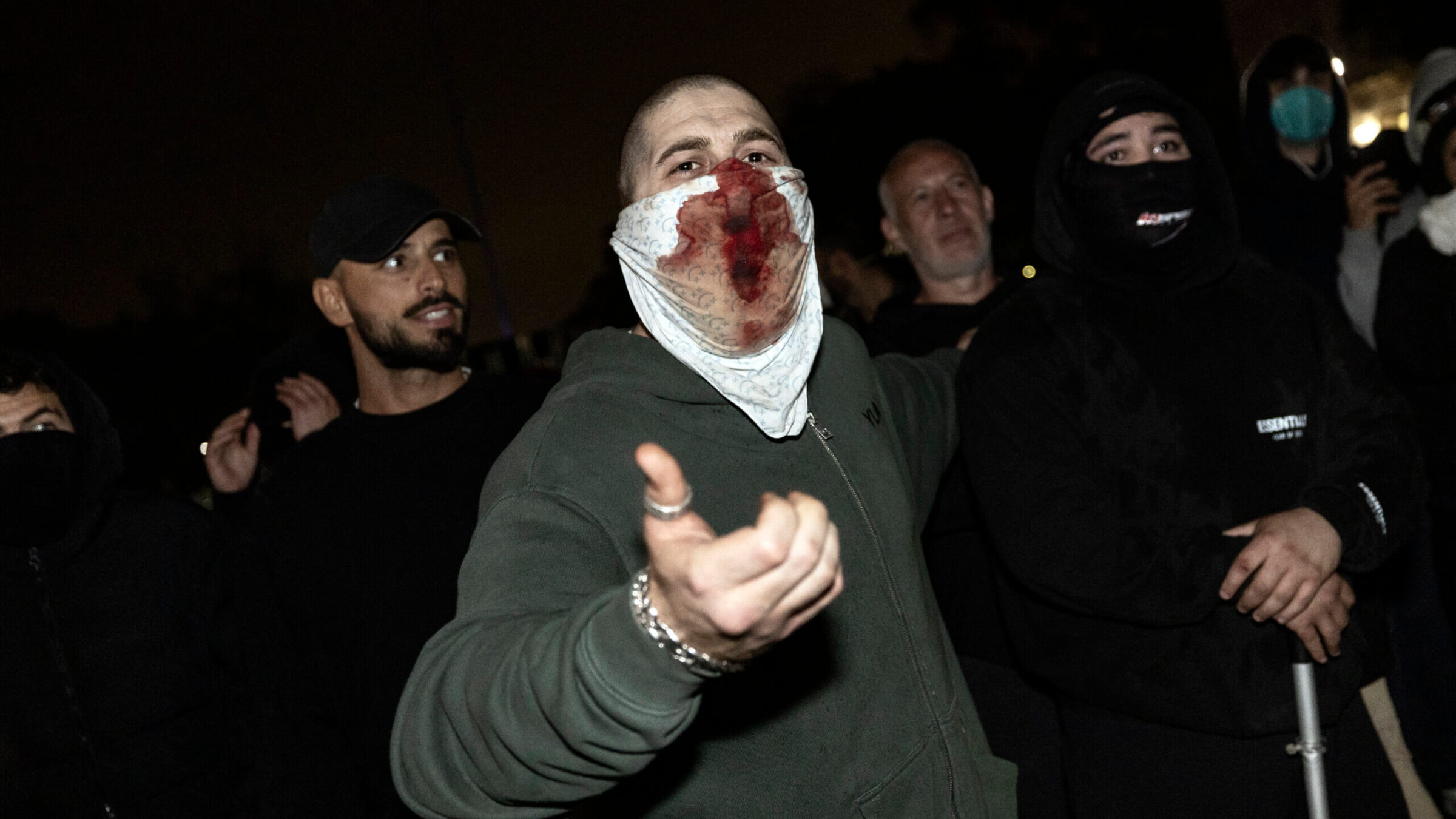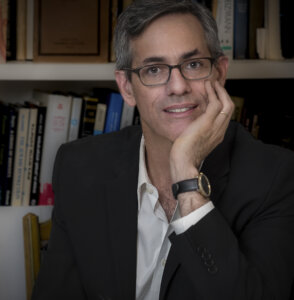I’m a UCLA professor. Why didn’t the administration stop last night’s egregious violence?
The university should have anticipated Tuesday night’s chaos — but security personnel were nowhere to be found

A counter protester shouts at pro-Palestinian protesters at a pro-Palestinian encampment set up on the campus of the University of California, Los Angeles, May 1. Photo by Etienne Laurent/AFP via Getty Images
UCLA, a prestigious public university in the United States, experienced one of the darkest nights in its 105-year history on Tuesday. Over the course of my 33-year career at UCLA, I have never seen anything so terrifying take place.
Around 11 p.m., a group of masked counterdemonstrators made their way to the Royce Quad in the heart of campus and began to attack the encampment set up last week by demonstrators opposing the war in Gaza. They threw a firecracker into the encampment, tore down its outer walls, threw heavy objects at demonstrators and instigated direct physical confrontations. Those in the encampment were left to fend for themselves against a violent band of thugs intent on inflicting damage.
The incident marked a total systems failure by the university, the city of Los Angeles and the state of California.
For three hours, the counterdemonstrators attacked the encampment with impunity. UCLA has its own trained police force, and the UCLA administrators with whom I spoke told me that the Los Angeles Police Department had been called to campus. But, somehow, there was no police presence whatsoever until the early hours of the morning.
What makes last night all the more inexplicable was that the university had, over the weekend, seen a haunting warning of what could happen.
On Sunday, a number of Jewish and Israeli groups, including the Jewish Federation of Los Angeles and the Israeli American Council, sponsored a rally on campus to advocate for the protection of Jewish students. The rally featured speeches by local Jewish public figures, along with musical performances.
But just adjacent to the rally, which occurred near the student protesters’ encampment, there were a number of sites on the edges of the main campus quad in which hundreds of demonstrators and counterdemonstrators converged and moved toward each other until they stood nose-to-nose. The tension was palpable, and it was striking that there was no police or safety officer presence.
Sensing that the confrontation could explode, a number of colleagues and I inserted ourselves between the two groups to serve as a buffer. We heard a constant stream of invective, epithets and accusations; witnessed pushing and shoving; and tried to intervene when punches were thrown. It got scary at times, as if a mass melee or even stampede might break out.
Over the course of our hours on the front lines, I estimate that more than 90% of the verbal and physical instigation came from the agitated counterdemonstrators, a fair number of whom spoke Hebrew and appeared to come from outside campus. The anti-war group had yellow-vested personnel who maintained discipline and sought to deescalate when the threat of violence arose.
But even they were greeted with insulting words from the other side, as were members of a small contingent of a local chapter of Standing Together who came bearing signs calling for peace and equality for Palestinians and Jews.
I do not know whether there was overlap between the counterdemonstrators on Sunday and those who provoked last night’s violence, who carried Israeli and American flags, as well as at least one Chabad flag celebrating “Mashiach,” or the Messiah. But the behavior of the two groups bore striking similarities, making it all the more unsettling that UCLA wasn’t better prepared.
That’s especially true because, on Sunday, I observed a contingent of university police officers standing passively a couple hundred yards from one of the main hot spots. When I went over to ask them why they weren’t helping to keep the peace, one officer told me that they were game-planning their strategy.
And no LAPD officers arrived to help us diffuse the situation over a period of more than two hours — even though we had been told that they were on their way.
That no police or skilled de-escalators intervened on Sunday was, at best, a bad mistake; a cohort of trained personnel could have made a big difference. That none appeared for hours Tuesday night, especially after observing the tension on Sunday, was unconscionable.
Before Tuesday’s melee, I felt as if our university had handled the recent anti-war protests relatively well. There was no heavy-handed police take-down, as had occurred at Columbia and the University of Southern California. In the face of immense pressure, UCLA Chancellor Gene Block managed to keep the peace.
In recent days, administrators have faced growing calls from some on campus to prevent anti-war demonstrators from blocking free access to points of entry around the encampment. There has also been increasing pressure on the university from outside forces, including the Jewish Federation, to act more forcefully against the demonstrators.
One model that might have been followed was that of Brown University, where school officials engaged in a productive negotiation with demonstrators leading to the peaceful dismantling of an encampment yesterday.
Instead, UCLA now finds itself in a far more vulnerable place. The attack last night was pure anarchy in which violent thugs were given free rein, seemingly with the tacit support of law enforcement. It placed scores of anti-war demonstrators in the encampment in direct and serious danger.
Moreover, the actions last night do absolutely nothing to assure the security and well-being of Jewish students, staff or faculty — a number of whom have participated in or support the protests. These actions risk lending the false impression that the outside agitators are representative of Jewish interests on campus, which can further inflame tensions between student groups.
Our campus leaders must not only condemn the egregious violence of last night but proceed to investigate how the anti-war protesters were left defenseless for hours. At the same time, they must make clear that expressing opposition to the war in Gaza is legitimate, that antisemitism and Islamophobia have no place on campus, and that irresponsible rhetoric about the danger posed by largely peaceful demonstrators contributed to the horror of last night.
Meanwhile, leaders of the Jewish community must not only condemn the unprovoked attacks of last night; they must also call out the malign actors from within who purport to defend Jewish students, but engage in the very heinous acts of which they accuse the other side.
Only then can they lay claim to the mantle of leadership, which they so completely abandoned last night.























